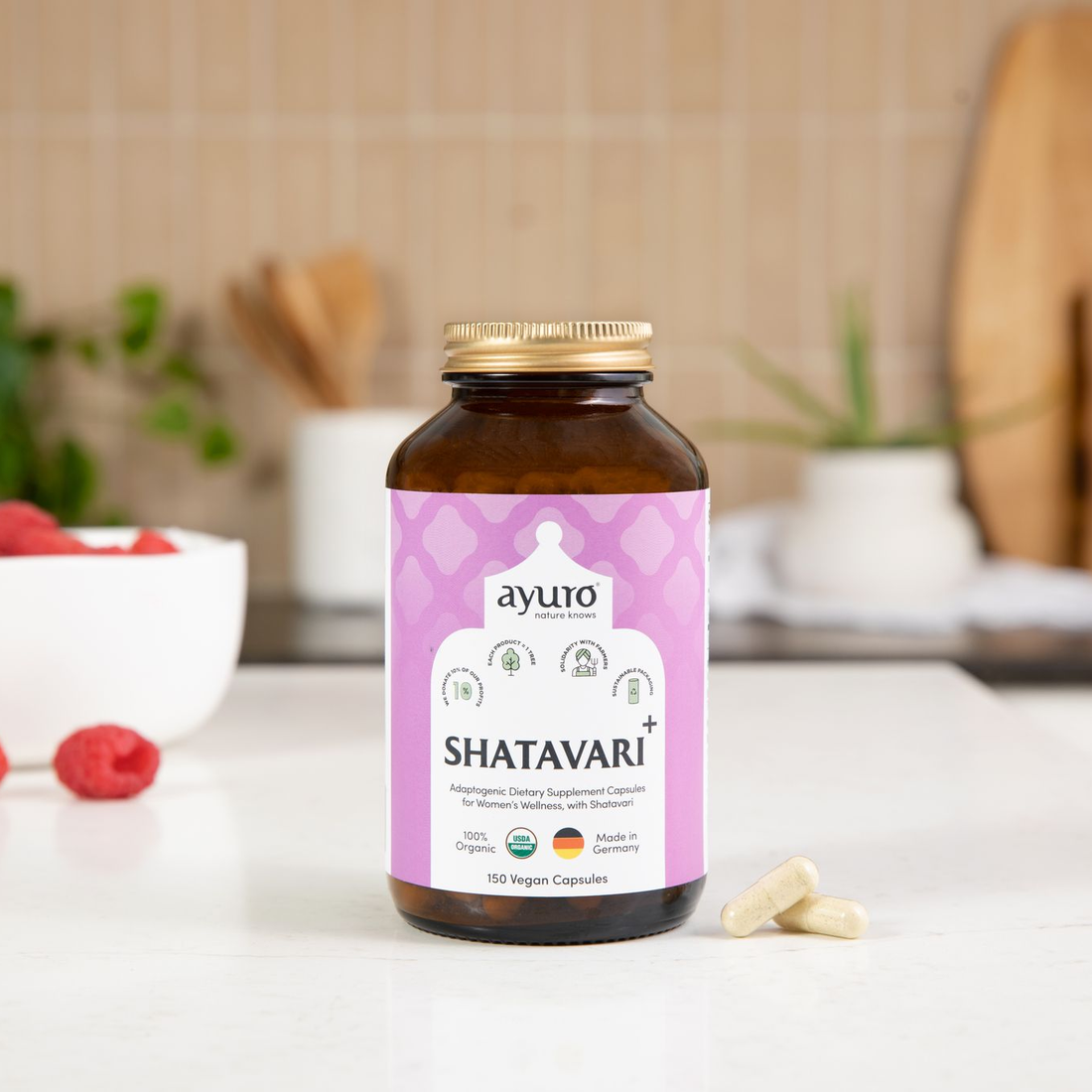Ayurveda is a holistic healing system that followers have successfully practiced for thousands of years. Ayurvedic medicine allows us to experience optimal, balanced health - naturally.
This guide unlocks the basics of Ayurveda in understandable terms, making it easy for everyone to understand and enjoy the incredible healing potential of this ancient practice.
The Mother Of All Healing
The word Ayurveda is translated from Sanskrit words and means "The Sacred Knowledge of Life" It offers a complete understanding of the human body and its intrinsic connection with nature.
Ayurveda encourages us to maintain health and balance using herbs and elements like a healthy diet, exercise, and enough sleep, together with practices that help maintain mental health, like mindfulness, yoga, and meditation.
Ayurveda can help us achieve and enjoy our natural capacity to be well and can help us to:
- Maintain physical, emotional, and mental balance.
- Become more in sync with our inner self.
- Honor our strengths.
- Uncover our weaknesses so we can work on them.
As you can see, Ayurveda is about so much more than taking natural medicine to cure some ailment. It encourages everyone to actively participate in their inner journey towards a balanced and healthy life.
Ayurveda In Life
The first step to determining your individual constitution or energy pattern is to understand the practical application of Ayurveda.
According to Ayurvedic teachings, the three functional principles, energies, or doshas, exist in everything in nature, including people. These energies have Sanskrit names: vata, pitta, and kapha - each with particular physical, emotional, and mental characteristics. They also link to the five elements, space, air, water, fire, and earth.
Every person has qualities of all three doshas but at different levels of prominence, creating a unique energy pattern. Although it is as unique as a fingerprint, this pattern can change due to lifestyle choices and environmental factors.
According to Ayurvedic teachings, too much or too little of these energies disrupt our balance and can result in discomfort or disease. Let's delve a little deeper into the doshas, their link to the elements, and what this all means for your health and well-being.
Vata Dosha

Space and Air - Vata
Vata is linked to the subtle energy of movement in the body and comprises space and air elements. It takes care of how the heart pulsates, your breathing, blinking, and how your muscles and tissues interact and move. The vata dosha even governs movement on a cellular level.
When vata is balanced, you can enjoy the flexibility and optimized creativity. Excess vata produces insomnia, anxiety, and fear. Aching joints, dry skin, and hair are common symptoms of a vata imbalance. Rheumatism, gout, and nerve disorders are all diseases connected to a vata imbalance.
Recognizing Vata
People with vata dosha predominant are usually creative, flexible, and alert. They tend to walk and think quickly but may struggle with feeling grounded. The vata mind-body type has variable digestion and appetite and may be particularly sensitive to cold - even cold liquids and foods. They prefer salad and raw vegetables but may benefit from the warm balance of warm foods and cooked vegetables. This dosha's season is fall.
Balancing Vata
Here are some general guidelines to correct a vata imbalance:
- Stay warm with well-cooked, warm foods and spices.
- Avoid frozen, excessively cold, or raw foods.
- Avoid freezing weather.
- Enjoy meditation to promote calmness.
- Enjoy a daily oil massage with essential oils.
- Maintain a regular routine.
- Rest often and well.
Vata diet choices:
The vata dosha requires naturally sweet foods like fruit and does well with lean meats and eggs. They should avoid sour fruits. To balance vata, incorporate nuts and seeds like pumpkin seeds, oils like sesame oil, grains, and root vegetables into daily meals.
Pitta Dosha

Fire and Water - Pitta
Pitta governs digestion and metabolism in the physical body and comprises water and fire. It connects to body temperature, metabolism, and how you absorb and assimilate nutrition.
When pitta is balanced, it cultivates intelligence and understanding. The pitta dosha evokes jealousy and anger when it's out of balance. Excess pitta can cause inflammation, acid reflux, indigestion, and even manifest in a burning sensation and red skin.
Recognizing Pitta
Ruled by fire, summer is pitta season. Pitta types usually have leadership qualities. They're athletic and strong in body, mind, and personality. The pitta person is generally of medium height and has a strong appetite, metabolism, and good digestion. They enjoy a lot of food and hot spices even though their constitution is better balanced by bitter, sweet, and astringent tastes.
Balancing Pitta
Here are some general guidelines to correct a pitta imbalance:
- Limit spicy, warm food and warm drinks.
- Enjoy cooling foods and cold drinks instead.
- Avoid excessive heat and oil.
- Watch out for too much salt.
- Wait for the cooler time of the day to exercise.
Pitta diet choices:
For an imbalanced pitta, incorporate juicy fruits and fresh, whole foods that are energizing and high in carbohydrates. Avoid oily food and large quantities of heating spices like black pepper and cayenne.
Kapha Dosha

Water and Earth - Kapha
Kapha is associated with structure and lubrication in the body. It is formed from earth and water and is known as the winter dosha. Kapha energy is the 'glue' that keeps bones, muscles, and cells together. It ensures a water supply for the entire system, lubricates the joints, and moisturizes the skin.
When the kapha dosha is in a balanced state, it promotes love, forgiveness, and a calm predisposition. When unbalanced, kapha results in envy, greed, and attachment. Excessive kapha energy can cause heaviness in the mind and body, sluggishness, and a lack of motivation.
Recognizing Kapha
Kapha types have loving dispositions and are grounded, stable, calm, tolerant, and forgiving. They are physically strong but tend to avoid exercise. Because of this and a slow metabolism, kapha people tend to gain weight quickly. Kapha people usually enjoy salty tastes and oily foods but are better balanced by pungent, astringent, and bitter tastes.
Balancing Kapha
Here are some general guidelines for a balancing kapha:
- Regular exercise is essential.
- Avoid fatty foods and dairy products.
- Eat light, dry food.
- Avoid iced foods and drinks.
- Enjoy a varied routine.
- Avoid napping in the daytime.
Kapha diet choices:
A kapha balancing diet is minimalistic, with smaller meals that include healthy foods like leafy greens and legumes like mung beans and red lentils. Eating a lot of food with heavy qualities can worsen a kapha imbalance.
Ayurvedic Diet And Medicine
Ayurvedic medicine takes a natural, holistic approach to healing through disease prevention and balance through herbs, minerals, and other plant compounds. Western medicine treats symptoms and diseases using drugs, radiation, or surgery.
Ayurveda does not substitute Western medicine and surgery. Instead, it helps prevent health problems that require serious intervention. Both medicine systems can be helpful in their own ways, but Ayurveda is geared toward preventing disease. It considers the mind-body connection and encourages the nourishment of both to promote self-healing.













